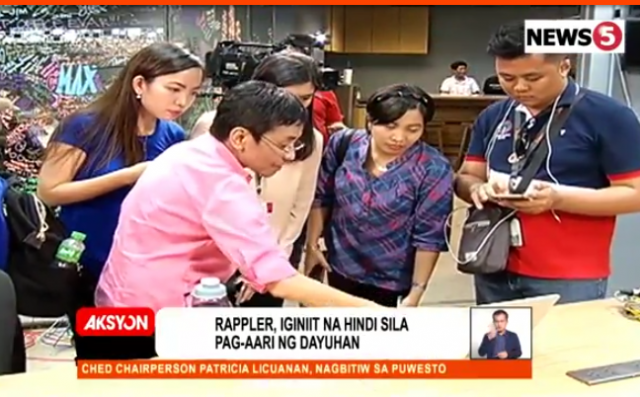The National Union of Journalists of the Philippines firmly on Tuesday came out in opposition to the proposal by the House Sub-Committee on Constitutional Amendments to change Article III, Sec 4 of the 1987 Constitution to read: “No law shall be passed abridging the ‘responsible exercise’ of freedom of speech, of expression, or of the press, or the right of the people to peaceably assemble and petition the government for redress of grievances.”
This proposal, NUJP said, “is as dangerous as it is, to put it as plainly as possible, stupid.
The Philippine Center for Investigative Journalism, on the other hand, cited the “horrifying implications on the full and untrammeled exercise of press freedom.”
NUJP said the proposed amendment would, “in effect, enshrine prior restraint as part of the basic law of the land and spell the end of the INALIENABLE rights and freedoms this particular provision seeks to protect.”
“If those supposed to protect and promote our most basic liberties can deign to snatch these away through such devious means, it is not farfetched to suspect that they intend to turn the Constitution into an abomination to enslave, not free, much less protect us,” NUJP said.
“We call on all independent Filipino journalists and media groups, and on all our fellow citizens who cherish freedom to come together and discuss how we can prevent this brazen attempt to hijack democracy.
“Let us resolve to take common action lest we again lose everything.”
PCIJ described as “harsh” the decision of the Securities and Exchange Commission (SEC) en banc to revoke the certificate of incorporation of the digital media company Rappler: “The SEC – as it had ruled on similar cases concerning The Nationality Rule, The Control Test, or The Grandfather Rule on foreign investments in prohibited sectors – could have … imposed penalties or fines, or ordered Rappler to amend its papers or unload its foreign investments. The SEC did not. Hence, the journalism that Rappler typifies is now in serious peril.”
“The Constitutional guarantee of freedom of the press could have prevailed over the Constitutional prohibition on foreign ownership of media corporations, if the latter indeed is an issue with Rappler,” PCIJ added.
A few years ago, according to PCIJ, the SEC had shown “inexplicable leniency” toward telecommunications giant PLDT, or Philippine Long Distance & Telephone Co., that was investigated for supposedly skirting the Constitutional rule on 60% Filipino vis 40% foreign ownership of public utilities.
“The SEC did not order PLDT’s dissolution on the pretext that doing so would impair telco service delivery by PLDT,” PCIJ pointed out.
Today, it added, “the SEC seem to have glossed over the fact that the harshest penalty of revoking the corporate registration of the Rappler would have impaired its delivery of news and information on matters of public concern, or even the Constitutional guarantees of press freedom and the people’s right to know.”
In its decision on Rappler, the SEC has morphed from lenient to severe, PCIJ said. “Indeed, beyond the sphere of journalism, the Rappler story will move next to the sphere of the courts and judicial processes.
“The case will soon reach the Court of Appeals, where Rappler said it plans to challenge the SEC decision in the next fortnight. The case will move as well to the Department of Justice, where the SEC decision has been referred for investigation into possible violations by Rappler of the Anti-Dummy Law.
“The 29-page SEC decision found that when Rappler Holdings Corp. (which owns Rappler, Inc.) issued Philippine Depositary Receipts to Omidyar Network in 2015, it signed on to an agreement with a provision that supposedly allowed control of Rappler by a foreign group.”
It is a provision, PCIJ articulated, citing SEC, “that violates the Foreign Equity Restrictions in the Mass Media that the Constitution prescribes because “the stockholders must have prior discussion with and approval of at least 2/3 of the PDR Holders, meaning Rappler is at the very least under obligation to consult with Omidyar Network. The stockholder has become, in effect, subservient to the holder. It is neither 100% control by the Filipino stockholders, nor is it 0% control by the foreigner PDR holders.”
The political context of this story cannot be ignored, said PCIJ. “It is happening amid the internecine outbursts of displeasure and vitriol by President Rodrigo R. Duterte and his closest allies against Rappler, the Philippine Daily Inquirer, ABS-CBN, and generally journalists and media entities on the independent and critical reporting track.”










